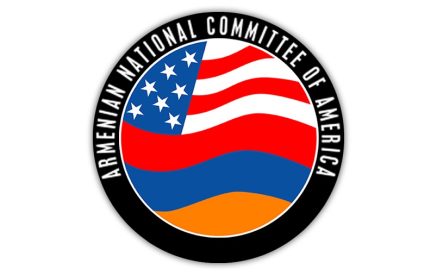By ALEX GALITSKY
Policy Director, Armenian National Committee of America
Last week, Congressman Darrell Issa, Vice Chairman of the U.S. House Committee on Foreign Affairs, introduced the so-called “PEACE Act” – a bill that is being portrayed as a bold measure to deter further Azerbaijani aggression against Armenia.
Despite claims the PEACE Act would apply “unprecedented sanctions” against Azerbaijan, the bill is a paper tiger – designed to appear tough, while redundant, unenforceable and narrow in scope. Sanctions would apply only to “renewed aggression” against Armenia – while neglecting Azerbaijan’s ongoing occupation of sovereign Armenian territory, the detention and abuse of Armenian hostages, the destruction of Armenian heritage and property, and the right of Artsakh’s Armenians to return to their homes in safety and dignity.
As a result, the PEACE Act holds Azerbaijan to a very low standard of accountability – “deterring” only “renewed aggression”, while excusing and normalizing Azerbaijan’s ongoing human rights abuses and occupation of Armenian territory. A cheap consolation prize for Armenia that would close the door on real justice and accountability.
Read also
Why the PEACE Act Falls Short
Sanctions Without Enforcement: While Congress can authorize sanctions, enforcement is almost entirely at the President’s discretion. Even if an individual or country meets the criteria for sanctions, the President is not obliged to enforce. Additionally, most sanctions (including the PEACE Act) grant sweeping discretionary authority to the President to waive and bypass sanctions when deemed to be in the “national security interests of the United States” – the rationale used by successive administrations to waive statutory prohibitions on military assistance to Azerbaijan over the past two decades, including under Trump.
Distraction From Existing Accountability Tools: The President already has the authority to impose sanctions on Azerbaijan. Global Magnitsky Sanctions allow the President to freeze financial assets and deny entry to Azerbaijani officials responsible for human rights violations. The EU, UK, Canada, and Australia have equivalent legislation – meaning U.S. enforcement could encourage enforcement in other jurisdictions. Tools to target Azerbaijan’s energy industry also exist, particularly concerning its energy and security ties with Russia and Iran. Washington’s refusal to enforce these existing sanctions mechanisms casts doubt as to whether the PEACE Act, if passed, would ever be enforced.
Deepening U.S. Interests in Azerbaijan: Washington’s involvement in the Armenia-Azerbaijan peace process is primarily motivated by regional energy interests. This is evidenced by the Trump Route for International Peace (TRIPP), which would secure exclusive U.S. development and operational rights to the “unimpeded [transport] connectivity” through Syunik connecting Turkey to Azerbaijan; the U.S.-Azerbaijan memorandum of understanding to expand cooperation in the defense and energy sectors; and an agreement between ExxonMobil and SOCAR to expand US investment in Azerbaijan’s energy sector. Any suggestion that the Administration would sanction the very energy industry it has been steadily expanding its investments in is, at best, naïve, and at worst, deliberately misleading.
Focus on “Renewed Aggression” Ignores Ongoing Violations: The bill’s focus on deterring “renewed aggression” comes at the expense of addressing the ongoing human rights and security issues left unresolved in the bilateral peace process – despite these issues posing the most immediate threat to Armenia’s security, and the prospects of a just peace in the region. In ignoring these issues, the PEACE Act normalizes and rewards Azerbaijan’s aggression up until this point. By drawing an arbitrary distinction between “current” and “renewed” aggression, Azerbaijan could simply refrain from new escalatory actions while continuing its abuse of Armenian prisoners and consolidating its occupation of Armenian territory without triggering sanctions under the PEACE Act.
Unanswered Questions & the Armenian Government’s Role
While the Armenian Government’s proxies have welcomed the PEACE Act, they are unable to explain why sanctions should apply only narrowly to renewed aggression and not the ongoing occupation of Armenian territory, or the detention and abuse of Armenian hostages. Nor can they explain how this bill could credibly deter future aggression while excusing current violations.
Sanctions and accountability tools that could target Azerbaijan’s energy industry, deter military aggression, and ensure justice for human rights violations already exist and enjoy strong bipartisan congressional support. Why undermine efforts to enforce these existing sanctions by introducing a redundant and unenforceable bill that lowers the standard of accountability for Azerbaijan by normalizing its ongoing human rights abuses and aggression?
Washington’s deepening energy investments in Azerbaijan cast serious doubt as to whether the Trump Administration would enforce sanctions on Azerbaijan’s energy industry. Why would the Administration enforce energy sector sanctions while it is actively expanding energy cooperation with the country, and given its refusal to address the complicity of Azerbaijan’s energy in circumventing sanctions on Russia and Iran?
Why have the Armenian Government and its proxies opposed efforts to ensure the release of Armenian hostages, the protection of Armenian heritage and property, and support for the right of forcibly displaced Armenians to return to Artsakh – even though the Administration has affirmed its support on these issues? Why has the Armenian Government not leveraged Washington’s role to use sanctions to pressure Azerbaijan to release Armenian detainees and withdraw its forces from Armenia’s sovereign territory?
These questions only underscore the fact that the PEACE Act was never designed to be enforceable – and was only ever intended to offer a symbolic rebuke to Azerbaijan without meaningful consequences. The bill is a face-saving measure for the Armenian Government and its proxies to ameliorate concerns about the lack of tangible security guarantees for Armenia in the peace process, while sidelining efforts to ensure accountability and justice for Azerbaijan’s human rights violations and ongoing aggression.
A Better Path Forward
The U.S. has a vital role to play in resolving the human rights and security issues, given their exclusion from the bilateral peace agreement. External pressure is essential, given the initialed peace agreement’s stipulation that Armenia withdraw its legal complaints against Azerbaijan before the international courts – closing legal avenues to ensure the release of Armenian POWs, the protection of Armenian heritage and property, and the right to a safe and dignified return for Artsakh refugees.
Having already agreed to abandon the legal avenues to justice, the Armenian Government and its proxies now seek to sabotage the political avenues too, by advancing a redundant and unenforceable bill that risks normalizing Azerbaijan’s ongoing aggression and human rights abuses in exchange for little more than a symbolic scolding.
Congress should instead focus on enforcing existing accountability measures to impose meaningful consequences on Azerbaijan for its ongoing aggression, including:
Strengthening Section 907 of the FREEDOM Support Act: Congress should strengthen existing restrictions on U.S. military assistance to Azerbaijan by limiting the President’s ability to bypass these prohibitions until Azerbaijan releases Armenian hostages, ensures the protection of Armenian heritage and property, and withdraws its military forces from Armenia’s sovereign territory.
Global Magnitsky Sanctions Enforcement: Congress should compel the Administration to enforce Global Magnitsky Sanctions against Azerbaijani officials responsible for war crimes and human rights abuses by passing the Azerbaijan Sanctions Review Act of 2025, and utilizing its Congressional oversight powers.
Secondary Sanctions Enforcement on Evasion: Congress should compel the Administration to enforce secondary sanctions against Azerbaijan for its well-documented collusion in the evasion of sanctions on Russia and Iran’s energy and security sectors – a more realistic and politically potent way to target the country’s energy industry, given the Administration’s recent crackdown on sanctions evasion.
Congressional Oversight Tools: Congress can use its statutory oversight function to force a review and suspension of U.S. military assistance to Azerbaijan through mechanisms like Section 502B(c) of the Foreign Assistance Act.
Conclusion
By targeting only “renewed aggression” and neglecting Azerbaijan’s ongoing human rights violations and occupation of sovereign Armenian territory, the PEACE Act risks normalizing Azerbaijan’s conduct and undermining efforts to ensure real justice and accountability for its aggression. Given the bilateral peace agreement’s exclusion of any provision to ensure the release of Armenian prisoners, the protection of Armenian heritage, and the right of return to Artsakh, the PEACE Act falls short of the bold action needed to address the issues that represent the most fundamental obstacle to a just, durable, and dignified peace in the region. Peace is not possible in the absence of justice, and aggression can’t be deterred while it is being normalized and rewarded.






















































